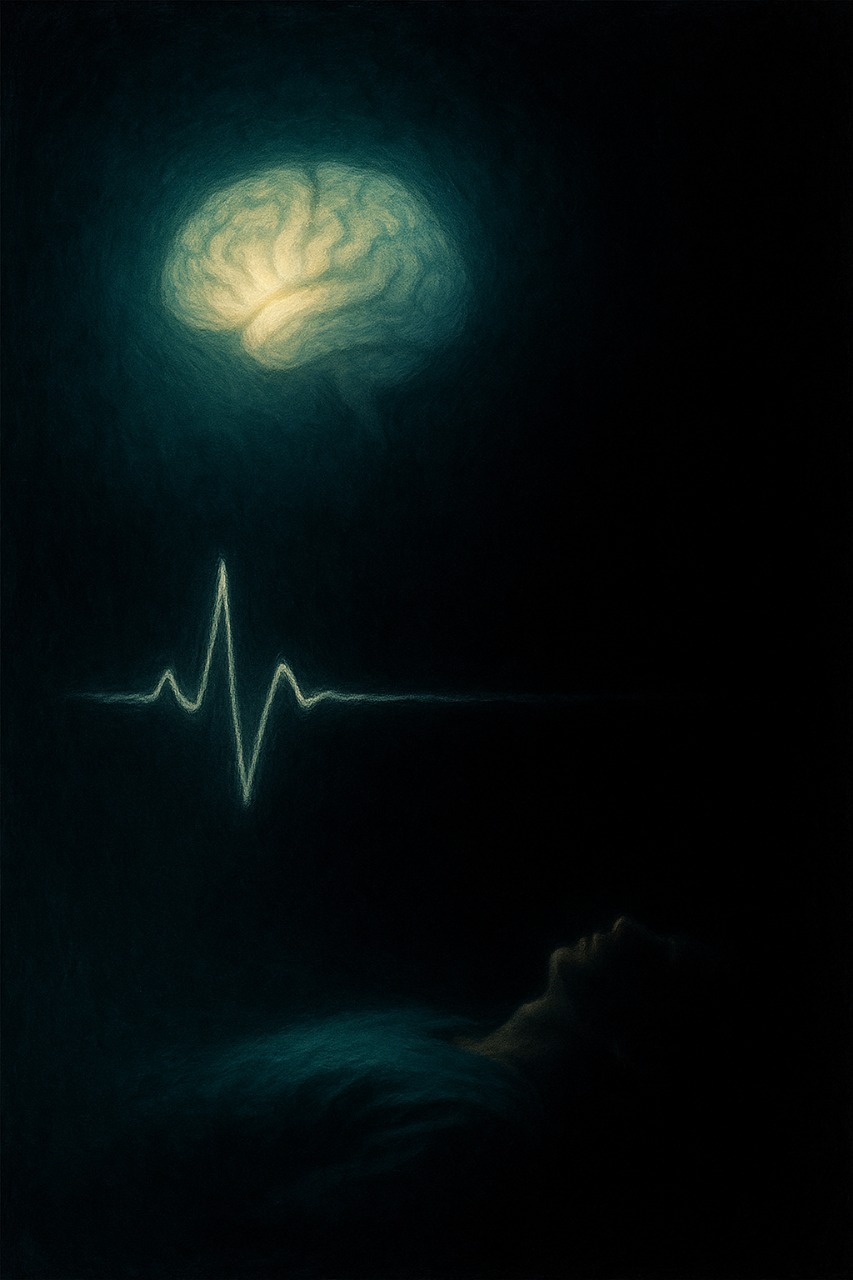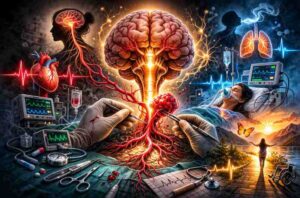Fainting — the world going dark, your body abandoning you — can feel like the end, but in most cases, it’s just the body’s failsafe during overload; a reminder of our human frailty
It’s never comforting when a school friend calls you and begins with, “Maz, I think I nearly died today.” With school friends, it’s easy to retort by saying, “Thank God you didn’t, because there’s no way I could have cancelled surgery or even OPD to make it for the funeral!”
He had slipped on the stairs, landed hard on his back, and the pain had been so intense that everything went black. For a few seconds, he fainted. When he arose from the ashes, he was convinced he had brushed past death. “It was like the lights went out,” he said. “One moment I was there, the next I was nowhere.” Pretty similar to how my daughter explains a Social Studies period at school.
For doctors, fainting is common. For patients, it is terrifying. It feels like the end. The body abandons you, the world disappears, and you have no control. If you’ve ever blacked out, you’ll know the fear: Was that my final moment? We call it syncope, a brief interruption of blood and oxygen to the brain. It sounds simple when written in a textbook. It doesn’t feel simple when you’re the one hitting the floor. Sometimes it happens to people when they pee, sometimes it even happens in the middle of sex. That’s why I find medicine both funny and tragic in simultaneity.
I’ve seen fainting in many forms. The heroine of old Bollywood films, clutching her forehead and collapsing on cue. A bridesmaid at a wedding, locked knees, swaying, and then gone. The commuter in a crowded Mumbai local, dehydrated, squashed, and passed out before anyone realises; the problem here in particular is that if you do faint, you’d have to do it vertically.
And then there are my friends. One, an adventure junkie, fainted while skydiving. He was so overwhelmed by the thrill that he passed out mid-air and had to be rescued by his instructor tugging furiously at his harness. He now says, quite seriously, that he paid for the jump but got the fall for free. Another, who plays football every Sunday, faints almost every time he takes a rough tumble. His teammates are so used to it that they place him on the bench, fan him with a jersey, and wait for him to wake up. Five minutes later, he’s back on the pitch, arguing with the referee. The body is a predictable drama queen. Some faint at the sight of blood, others at needles, some even before an angry spouse.
Why do we faint? Because the brain doesn’t get what it needs for a few seconds. Blood. Oxygen. The essentials. Sometimes the heart is to blame — an irregular rhythm, a blocked valve, a pump that falters. Sometimes it’s the brain — a seizure, a stroke, a migraine gone uncontrolled. I was recently on a flight where they announced for a doctor on board. A middle-aged lady mid-conversation had become unresponsive. Even in my sleep-induced haze, from a distance, I could tell she was having a seizure. I simply sat with her till she returned to us, while her husband, ironically a surgeon himself, was freaking out.
Sometimes the body simply overreacts. Pain, heat, hunger, fear — and the nervous system trips like a power line in the rain. That’s what happened to my friend. He fell, the pain was unbearable, and his body decided it had had enough and switched him off. Like an office building cutting the main fuse after too many air conditioners are plugged in.
Most of the time, fainting is harmless. But sometimes, it’s not. That’s the trick. And thankfully, as of now, you still can’t use AI to tell the difference.
If you faint after skipping breakfast, fine. Drink water, eat something, sit down. But if you faint in the middle of a run, or while climbing stairs, or while sitting calmly at dinner, you should worry. If you faint more than once, you should definitely worry. And if you faint with chest pain, palpitations, shortness of breath, or weakness on one side of your body, you shouldn’t even waste time worrying — you should go straight to a doctor. It takes only a few tests to find answers. An electrocardiogram. An echocardiogram. A brain scan. Sometimes the result is reassuringly ordinary: “You’re just dehydrated.” Sometimes it’s lifesaving: “You have an arrhythmia or a brain tumour, and we caught it in time.”
My friend came to see me after his fall. We ran through the heart and brain. Everything was normal. His blackout was simply his body’s exaggerated reaction to pain. “So, I’m not dying?” he asked. “Unfortunately, not!” I laughed. He chuckled, but not convincingly. “For those seconds, I really thought I’d gone.” “That’s the strange thing about fainting,” I told him. “It’s like a rehearsal. A brief glimpse of absence, followed by the return of light.” Another friend told me, “It’s a little bit like smoking weed – you’re there, but not there!”
I often think fainting is the body’s way of reminding us how fragile we are. We march through life with plans and deadlines, standing tall and confident. And then one missed beat, one false step, one sudden trigger — and we fold like a badly pitched tent. It’s humbling. Perhaps it’s necessary. William James once wrote, “The greatest weapon against stress is our ability to choose one thought over another.” But when you faint, there is no choosing. The body decides. It chooses darkness, silence, surrender.
The next time you faint — whether from pain, panic, or the simple torture of Mumbai’s summer heat — remember that it isn’t always the end. But don’t dismiss it either. Sometimes it’s the body throwing a tantrum. Sometimes it’s the body sending you a warning. The smart thing is to pay attention. And ask yourself, as my friend did that night: Do you have a secret hunch about how you will die?





14 thoughts on “The surgical blackout”
Super though scary !!!!
Dearest Dr Mazda sir
Fantastic piece deviating from your regular Articles on Temporary Blackout & very very informative too .
So nicely explained the emergency situation & response….
Humor too to a friend unfortunately not died 🤣🤣
Bravo Sir for varieties of Topics
Excellent article..love your style of explaining Medical issues and giving public education with a sense of humor and great English literary style..keep it up..ai know your father, Dr. Keki Turel
Very well written as usual Mazda
You make your stories exciting edge of seat experience
Well done
Very very informative. Thank you
Dear Mazda, you r wonderful surgeon, but u have the gift of beautifully putting down your thoughts in words.
Very well written. 👏👏
👌👌👏👏
Beautifully put, Dr Mazda science with human touch.
Loved the way U described.
God bless.
Dear Dr Mazda
Wonderful as always…a balanced mix of very useful info and a witty touch that makes it so readable
Enjoyed the article
Very informative doctor.senior citizens like me sometimes feel we ll faint while getting up from bed but we don’t, when getting up after sitting in the park for sometime .but we walk away .So what to do then ?
Excellent very much informative
I was diagnosed with Parkinson’s disease four years ago. For over two years, I relied on prescription medications and therapies, but unfortunately, the symptoms continued to worsen. My mobility declined, tremors increased, and I experienced growing fatigue and discomfort that affected my daily life. Last year, out of desperation and hope, I decided to try an herbal treatment program from NaturePath Herbal Clinic. Honestly, I was skeptical at first, but within a few months of starting the treatment, I began to notice real changes. My energy improved, the discomfort eased, and I felt stronger and more capable in my daily life. Incredibly, I also regained much of my stamina, balance, and confidence. It’s been a life-changing experience I feel more like myself again, better than I’ve felt in years. If you or a loved one is struggling with Parkinson’s disease, I truly recommend looking into their natural approach. You can visit their website at www. naturepathherbalclinic .com
Reading this made me almost faint. Thankfully only from laughing 🙃